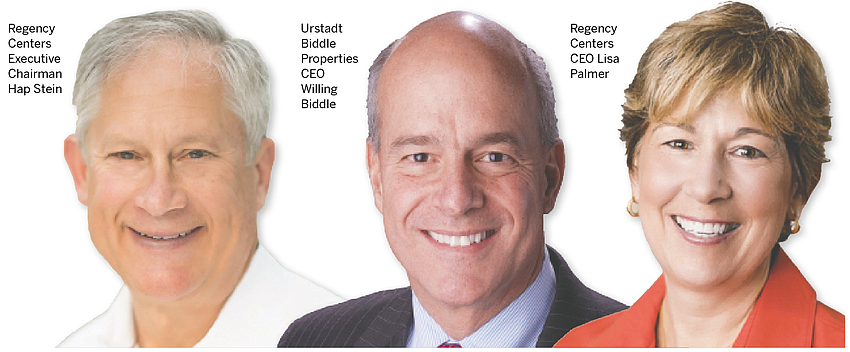
Eight months before the companies agreed to merge, Regency Centers Corp. Executive Chairman Hap Stein suggested to Urstadt Biddle Properties Inc. CEO Willing Biddle he should get to know Lisa Palmer.
Palmer succeeded Stein as chief executive of Jacksonville-based shopping center developer Regency on Jan. 1, 2020, and Stein and Biddle were discussing future opportunities for their companies.
According to a proxy statement filed for a special meeting of Urstadt Biddle shareholders, that September 2022 discussion led to Palmer contacting Biddle.
That led to the May 18 announcement of the $1.4 billion deal for Regency to buy Urstadt Biddle for an exchange of stock and assumption of debt.
Regency operates 404 properties across the country, mostly grocery-anchored shopping centers.
Urstadt Biddle operates 77 properties in the New York metropolitan area with an emphasis on grocery-anchored shopping centers.
The proxy statement filed June 16 said that a year before reaching agreement with Regency, Urstadt Biddle’s board began considering possible merger partners and approached one unidentified publicly traded real estate investment trust in June 2022.
That REIT did make a bid for Urstadt Biddle but the board decided the offer was inadequate.
CEO Biddle contacted the REIT’s CEO and they “both acknowledged that geopolitical and interest rate uncertainties had created a very difficult market for doing a transaction,” so they discontinued merger discussions, the proxy said.

The proxy does not mention any other merger negotiations before Stein and Biddle talked in September, leading to discussions between Palmer and Biddle.
Biddle contacted Palmer on Feb. 1 to ask about Regency’s level of interest in a deal.
“Although no specific pricing was discussed, Mr. Biddle indicated that Regency would need to understand that Urstadt Biddle was currently trading at a discount to net asset value and propose transaction consideration that recognized this disparity for any strategic transaction to be possible,” the proxy said.
That discussion spurred negotiations and Regency made an offer in April that valued Urstadt Biddle’s stock at $20.13 a share.
A few days after that, the REIT, which made the bid in June 2022, made a new offer that valued the company at $19.19 a share.
Urstadt Biddle’s board decided May 2 to ask both Regency and the REIT to make better offers.
Regency came back May 11 with an offer to exchange 0.347 shares of its stock for every Urstadt Biddle share. Based on Regency’s closing price that day, the offer valued Urstadt Biddle at $20.30 a share, representing a 35% premium to the closing price of Urstadt Biddle’s common stock that day.
The REIT made a final offer of a combination of cash and stock that valued Urstadt Biddle at $18.10 a share. So, the board decided to negotiate only with Regency, leading to the merger agreement.
The proxy statement does not set a date for the meeting of Urstadt Biddle shareholders to vote on the deal, but it said the companies hope to complete the merger late in the third quarter or early in the fourth quarter.
Fanatics Inc. increased its offer to buy the U.S. operations of PointsBet Holdings Ltd., after DraftKings Inc. tried to outbid the sports merchandising giant founded in the Jacksonville area.
According to one report, the higher price may have resulted from a grudge against Fanatics held by DraftKings CEO Jason Robins.
Fanatics on May 18 agreed to buy the U.S. operations of Australia-based PointsBet for $150 million as part of its plan to grow an online sports gambling business.
However, PointsBet announced June 28, two days ahead of a special shareholders meeting to vote on the deal, that Fanatics increased the offer to $225 million after DraftKings made an unsolicited offer to buy the operations for $195 million.
The New York Post reported June 23 that the bidding war for PointsBet came after failed merger talks between Fanatics and DraftKings in 2021.
The Post said Fanatics CEO Michael Rubin abandoned the idea for a merger of equals, and Robins was retaliating by trying to outbid Fanatics for the PointsBet operations.
“To suggest that there is an ulterior motive that is personal and not business related is irresponsible and not grounded in reality,” a DraftKings spokesman told the Post.
After PointsBet announced the higher offer from Fanatics, DraftKings issued a statement June 28 that it is no longer pursuing the PointsBet operations.
Fanatics has not commented on the Post report and hasn’t actually made any announcements on the PointsBet deal, although it posted news stories about its agreement on its website.
PointsBet, which is publicly traded in Australia, announced the agreements with Fanatics. The company said it was looking to sell the operations because of the high cost of doing business in the U.S.
Fanatics will gain access to sports betting in at least 15 states with the acquisition.
A PointsBet letter to shareholders on the deal said Fanatics has launched online sports betting in Tennessee and Ohio and retail sports betting in Maryland this year, with plans to expand into Massachusetts and other states.
The PointsBet board of directors continued to recommend its shareholders vote in favor of the Fanatics deal in the absence of a binding agreement with DraftKings. The board was concerned about potential U.S. antitrust objections to a DraftKings deal.
“In light of the anticipated heightened scrutiny of an acquisition of PointsBet by DraftKings, as compared to the FBG (Fanatics) Transaction, please provide written confirmation that DraftKings will assume the risk of delay and/or denial of antitrust approvals, as we intend to hold DraftKings to a ‘hell or high water’ standard with respect to antitrust clearances,” the PointsBet board said in a letter to Robins.
DraftKings is the second-largest U.S. sports betting company, according to data from gambling analytics firm Eilers & Krejcik in an Associated Press story.
The firm said in the 12 months ending in February, FanDuel was the market leader with a nearly 46% share, while DraftKings was second with 25%.
BetMGM had 12% and Caesars Entertainment had 6.7%, with other players including PointsBet at 2.4% or below.
When publicly traded DraftKings announced its offer, it posted a letter from Robins to PointsBet’s top executives saying “we believe that we are uniquely positioned to obtain the requisite regulatory approvals on a more expedient timeframe than under your existing agreement with Fanatics.”
Fanatics, founded with a single retail store in the Orange Park Mall in 1995, has turned into a sports merchandising giant valued at more than $30 billion.
Founders Mitchell and Alan Trager sold the business in 2011 to a Philadelphia company run by Rubin, who has expanded the company beyond its initial sports merchandising business with gambling and other ventures.
The company maintains its commerce headquarters in Jacksonville, according to the Fanatics website, which lists six major office locations.
A notice of the special shareholders meeting filed by PointsBet said Fanatics is headquartered in Jacksonville, New York and London.
Firehouse Subs opened its first restaurant in Europe on June 22 and announced plans to expand to Mexico.
The sandwich chain, founded in Jacksonville almost 30 years ago, had 1,247 restaurants at the end of the first quarter, mostly in the U.S., with 73 in Canada.
However, Restaurant Brands International Inc., which acquired the Jacksonville-based company in December 2021, announced the opening of a restaurant in Zurich, Switzerland, as the beginning of a global expansion of the Firehouse brand.
“Sandwiches represent one of the top food occasions for consumers across markets. With its truly differentiated product offering and strong brand heritage, we are confident that Firehouse Subs can achieve tremendous growth internationally,” RBI’s international President David Shear said in a news release.
RBI also announced a development agreement to open the first Firehouse restaurants in Mexico later this year and said it has plans to expand into other countries in Europe, Asia, Africa and Latin America.
Toronto-based RBI also owns the Burger King, Popeyes and Tim Hortons chains, which have a significant international presence.
The company reported 11,947 of its 18,911 Burger King restaurants at the end of the first quarter were outside of the U.S.
Popeyes had 1,231 of its 4,178 restaurants outside of the U.S.
A majority of the 5,620 Tim Hortons restaurants are in Canada.
RBI reported total first-quarter sales of $9.83 billion at all restaurants in its four chains, including company-owned and franchised locations.
Revenue in the quarter, consisting of sales at company-owned sites and fees from franchisees, was $1.59 billion.
About half of its revenue, $809 million, came from Canada.
U.S. restaurants accounted for $573 million in revenue and RBI had $208 million from other countries.
RBI bought Firehouse, founded in 1994 in Jacksonville by brothers and former firefighters Robin and Chris Sorensen, for $1 billion in December 2021.
The company said Firehouse’s international expansion will benefit from the scale and growth capabilities of RBI.
RBI said the international Firehouse sites will have menus and guest experiences based on its research of the local markets.
A group from Jacksonville has agreed to acquire control of Southern Bankshares Inc., parent company of The Claxton Bank in Georgia, the bank announced June 14.
The company said the investors are individuals from Jacksonville with a track record of leading and investing in banks, but it could not provide more details.
The bank, with offices in Claxton, Bellville and Richmond Hill, Georgia, has about $160 million in assets.